Tooth decay in toddlers
Emmy Samtani
Emmy Samtani
Up next
In this article
Tooth decay is the most common chronic disease in childhood and is most often preventable. If your child’s teeth aren’t cleaned well regularly, tooth decay can develop and can do so very rapidly. It left untreated, tooth decay can result in pain and worst-case scenario, swelling and infection. Poor oral health in childhood is the strongest predictor of further dental disease in adulthood.
Stopping the rot
Try to limit your child’s consumption of sugary foods and drinks such as lollies, soft drinks, biscuits, snack bars and muffins. If you do give your child a snack – try to choose a healthy option, such as fruit or cheese and try to limit grazing.
- Brushing your child’s teeth thoroughly twice-a-day for two minutes is vital.
- Having a healthy balanced diet plays a major role: control their consumption of sweets, soft drinks, biscuits and muffins
- Start flossing their teeth as soon as they have two teeth touching
Checking for decay
You can easily check the state of your child’s teeth by lifting their top and bottom lips. Things to look out for:
- White patches that are close to the gum and don’t come off after brushing are the early warning signs for decay and can be reversed.
- Grey, brown or black spots anywhere on the teeth is not a good sign. This may indicate more advanced decay, so book an appointment with your dentist as soon as possible.
- If your child is waking regularly in the night complaining of a sore tooth or has bad breath, these can all be signs of decay. Book an appointment with your dentist as soon as possible.
Sign up
Get tailored content based on your week of pregnancy
By signing up, you agree to receiving our Newsletters. Cancel anytime.



Whose job is it to stop decay?
Throughout childhood this responsibility is yours. Providing a healthy diet and teaching them how to properly brush and floss their teeth are important for them as they grow up. Take them to the dentist regularly starting from 12 months of age or when their first tooth appears.
Related Articles
Trending
Emmy Samtani
Follow +Emmy is the founder of Kiindred and mother to 3 little ones. Over the last 4 years, she has worked with some of the most credible experts in the parenting space and is a keen contributor on all things parenthood.









